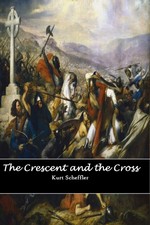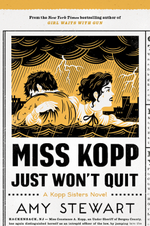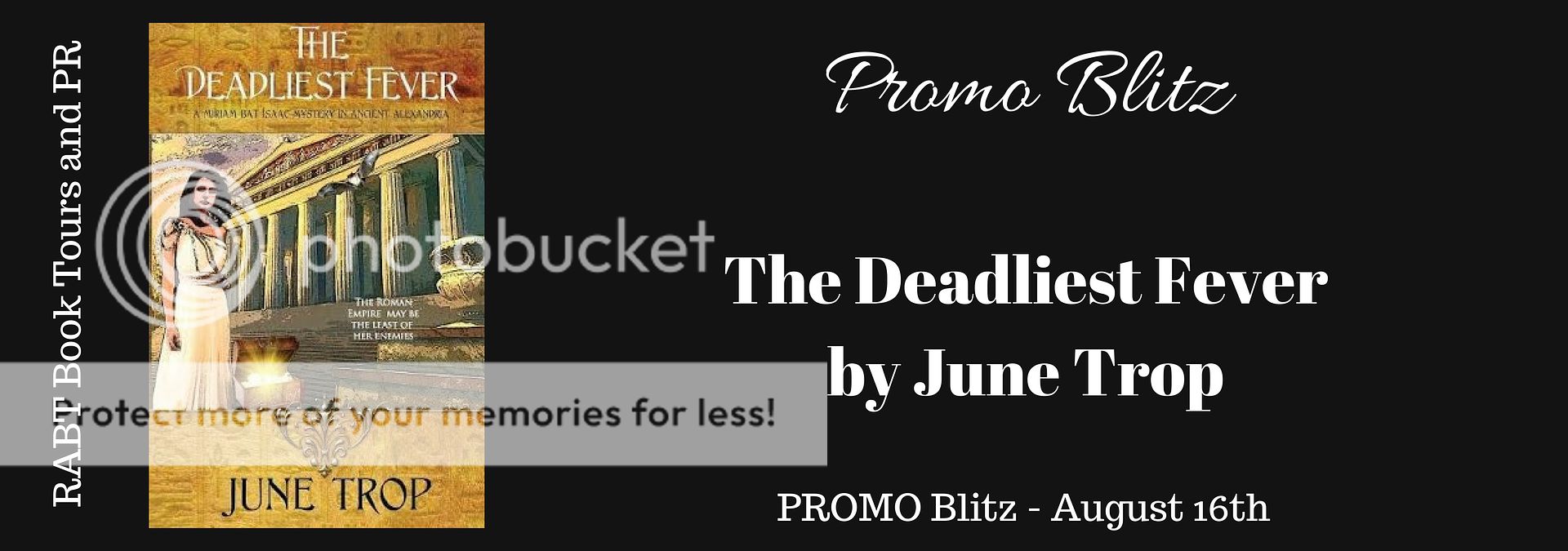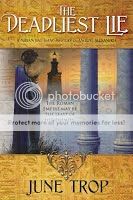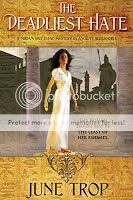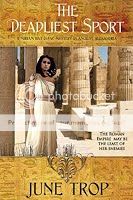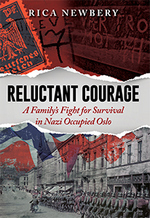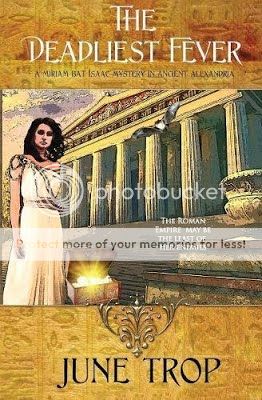
A Miriam Bat Isaac Mystery in Ancient Alexandria
Date Published: April 2018
Publisher: Black Opal Books
Miriam bat Isaac, a budding alchemist and amateur sleuth in first-century CE Alexandria, is concerned when she learns that the threads of gold in the Great Synagogue’s Torah mantle have been damaged. She takes the mantle to Judah, a renowned jeweler and the unrequited love of her life. He repairs the threads and assures her that the stones in the mantle are still genuine. Like Miriam, he is astonished that someone would damage the threads but leave the gems behind.
Shortly before, the Jewish community of Alexandria welcomed their visiting sage and his family, who had just arrived from Ephesus on the Thalia. Also on the ship were the perpetrators of an audacious jewelry heist. And shortly after, the captain of the Thalia is found dead in a sleazy waterfront inn.
Can Miriam discover the connections among the jewel heist, the death of the sea captain, and the desecration of the Torah mantle before the deadliest fever claims its victim? Not without help from the bite of a rabid bat.
Other Books in the Miriam bat Isaac Mysteries in Ancient Alexandria Mystery Series:
The Deadliest Lie
A Miriam bat Isaac Mysteries in Ancient Alexandria, Book One
Publisher: Bell Bridge Books
She’s a brilliant alchemist-with a talent for solving mysteries.
Miriam bat Isaac is a budding scholar in first-century CE Alexandria, though her dreams seem doomed. Who in her household or among her fathers Shabbat guests stole the scrolls containing the Alchemical League’s valuable formulas? Perhaps the thief was even her frantic father, on the cusp of financial ruin, eager for Miriam to end her dalliance with a handsome jeweler and marry into an honorable and wealthy family. Or her rebellious brother, intent on raising money to travel to Capua so he can enroll in the Roman Empires most renowned gladiator school. Or her faint-hearted fiancé, who begrudges her preoccupation with alchemy and yearns for their forthcoming marriage?
And how did the thief manage to steal them? Miriam is not only faced with a baffling puzzle, but, to recover the scrolls, she must stalk the culprit through the sinister alleys of Alexandrias claustrophobic underbelly. The Romans who keep a harsh watch over her Jewish community are trouble enough.
Miriam is based on the true personage of Maria Hebrea, the legendary founder of Western alchemy, who developed the concepts and apparatus alchemists and chemists would use for 1500 years.
June Trop (Zuckerman) has had over forty years of experience as an award-winning teacher and educator. Now associate professor emerita at the State University of New York at New Paltz, she spends her time breathlessly following her intrepid protagonist, Miriam bat Isaac, who is back in the underbelly of Alexandria, once again searching for a murderer in The Deadliest Sport while worrying about her brother.
The Deadliest Hate
A Miriam bat Isaac Mysteries in Ancient Alexandria, Book Two
Publisher: Bell Bridge Books
The Roman Empire may be the least of her enemies.
A secret alchemical recipe to transmute copper into gold surfaces in first-century CE Caesarea. As soon as Miriam sets out to trace the leak, Judean terrorists target her for assassination. Eluding the assassins while protecting a secret of her own, she discovers that she, herself, is responsible for the leak. Moreover she is powerless to stop its spread throughout the Empire and beyond.
But who is really trying to kill Miriam? Is it a case of mistaken identity, or is her late-fiancé’s ex-scribe, now an assistant to the Procurator of Judea, seeking to avenge an old grudge? Or is her heartthrob’s half-brother, a Judean patriot who inherited his mother’s mania, afraid Miriam knows too much?
And how did the recipe find its way from Alexandria to Caesarea anyway?
June Trop (Zuckerman) has had over forty years of experience as an award-winning teacher and educator. Now associate professor emerita at the State University of New York at New Paltz, she spends her time breathlessly following her intrepid protagonist, Miriam bat Isaac, who is back in the underbelly of Alexandria, once again searching for a murderer in The Deadliest Sport while worrying about her brother.
The Deadliest Sport
A Miriam bat Isaac Mysteries in Ancient Alexandria, Book Three
Publisher: Black Opal Books
Miriam bat Isaac, a budding alchemist in first-century CE Alexandria, welcomes her twin brother Binyamin home to fight his last gladiatorial bout in Alexandria. But when he demands his share of the family money so he can build a school for gladiators in Alexandria, Miriam explains that he forsook his share when he took the gladiatorial oath. When she refuses to loan him the money for what she feels is a shady, and dangerous, enterprise, Binyamin becomes furious. Soon after, the will of Amram, Miriam’s elderly charge, turns up missing, Amram becomes seriously ill, and the clerk of the public records house is murdered. Could Binyamin really be behind this monstrous scheme? If not he, who could be responsible? And is Miriam slated to be the next victim?
May 1, Thursday, Almost Midnight:
He waited, listening to the darkness flow into the sanctuary. With the thick drapes blocking the flare of torches lining the Canopic Way, the only light scratching the air was the meager glow of the eternal flame, the ner tamid of Alexandria’s Great Synagogue.
The coolness of the night had already begun to assert itself. Just a little longer, he told himself as his fist closed around the open edges of his long black robe. A few minutes later, as his other hand pulled back the hood over his head, he emerged from his hiding place, his body taut, his legs tingling from having stood in place for so long.
Stretching his cramped muscles, he approached the front of the Torah Ark. His fingers trembled with excitement, his eyes shining with greed as he drew open the parokhet, the curtain that screened the Ark.
“Like a bride’s veil,” he said to himself, amused by the analogy.
With a self-congratulatory nod and a tight satisfied smile, he pulled open the ornate bronze doors and carried the Torah to the Reader’s Table. For a few moments, he gazed at the coveted prize adorning the Torah mantle, three peerless jewels, each set into the bowl of one of the three vessels embroidered in gold on the mantle.
He didn’t need much light. His eyes were already accustomed to the darkness, and his hands had performed this procedure many times before. Taking a few deep breaths to calm the twitch at the corner of his mouth, he removed a slim wooden box from the goatskin pouch attached to his belt, took out his tools, and lined them up on the table: his silver pick, plyers, tweezers, snips, and a double-handled vial of olive oil. Then he undressed the Torah and positioned the mantle so the jewels caught the narrow strip of light from the ner tamid.
Oh, Lord! Even in the thinnest light, they spew out their fire!
Half-frightened, worried that he’d uttered the words aloud, he released only a feather of breath.
But hearing no echo, his jaw softened.
He was safe.
Then, hunching over the table, balancing his forearms against the edge, he took hold of the pick and laid his hands on the mantle.
He tried to loosen the center stone, the emerald. The setting was tight. Very tight. He tried again, this time after placing a droplet of oil on each prong.
This is going to take a while.
He shifted his weight and continued.
The silence was absolute save for the occasional sputter of the ner tamid and the distant rumble of hooves on the Canopic Way’s granite pavement.
Until he heard loudening footfalls ringing out against the tessellated floor, waking the echoes in the corridor’s coffered ceiling.
A crease of light swept under the sanctuary’s ceiling-high, bejeweled double doors.
He froze and held his breath, as fear prickled down his spine, until the clicking heels receded into the silence. He blinked slowly and released an unbidden sigh. Just the watchman on his rounds. He won’t come in here. He locked the doors to the sanctuary and all the outside doors to the Synagogue hours ago and won’t open them again until dawn.
His fingers worked through the night. Despite the chill, rivulets of sweat trickled down his back and collected under his belt. He straightened up now and then, rolled his shoulders back, and cocked his head as he admired his work.
His mouth curved into a triumphant smile.
Beads of saliva clung to his lips.
By now a pearly grayness was seeping under the doors. He could see the darkness dissolving. Objects in the sanctuary were reclaiming their color and shape.
He mentally ticked off the remaining tasks: Dress the Torah. Put it back in the Ark. Tuck my prize and the tools into the box. Slide it back into my pouch. Slip out as soon as the watchman unlocks the doors but before what’s-his-name…Gershon, that’s it, Gershon ben Israel…comes in to check the sacred—
Oh, Lord, what on Earth is that squeaking sound? Surely not a bird.
A sharp-toothed, leathery-winged bat shot out of nowhere, swooped across the sanctuary, and, wheeling around the bemah, took a dive, and nipped the crown of the man’s head before disappearing with a shrill screech behind the Ark.
His thin howl—part gasp, scream, and strangled sob—tore through the sanctuary.
Then he heard a pair of boots smacking the tiles.
I gotta get out of here! Where’s the—
Dressing it quickly, he shoved the Torah into the Ark, throwing everything else into his pouch.
Except the vial.
The vial. Oops!
Oil everywhere.
Oh, Lord! Not now.
A hasty wipe with the sleeve of his robe.
The rising volume of hammering footsteps.
Now two sets—one close, the other farther away but catching up. Their volume swelled as they turned a corner.
Must be Gershon trailing the watchman.
The jangle of keys. The ping of the latch as the watchman unlocked the doors.
No place to hide. And, Lord, all this blood gushing from my head.
“No, Daniel, no!” Gershon shouted. “The other way. Hurry! The scream came from the library.”
About the Author

June Trop and her twin sister Gail wrote their first story, “The Steam Shavel [sic],” when they were six years old growing up in rural New Jersey. They sold it to their brother Everett for two cents.
“I don’t remember how I spent my share,” June says. “You could buy a fistful of candy for a penny in those days, but ever since then, I wanted to be a writer.”
As an award-winning middle school science teacher, June used storytelling to capture her students’ imagination and interest in scientific concepts. Years later as a professor of teacher education, she focused her research on the practical knowledge teachers construct and communicate through storytelling. Her first book, From Lesson Plans to Power Struggles (Corwin Press, 2009), is based on the stories new teachers told about their first classroom experiences.
Now associate professor emerita at the State University of New York at New Paltz, she devotes her time to writing The Miriam bat Isaac Mystery Series. Her heroine is based on the personage of Maria Hebrea, the legendary founder of Western alchemy, who developed the concepts and apparatus alchemists and chemists would use for 1500 years.


![]()











 Read a book recommended by one of your parents (in-laws count).
Read a book recommended by one of your parents (in-laws count).
